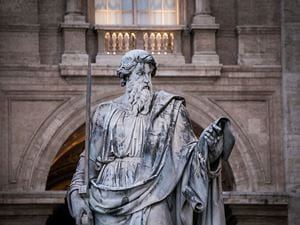
Pixabay.com
Even when speaking of some of its most influential figures, the Bible can be rather stingy with both personal and physical details. There are many people about whom little more is known than their name and birthplace. Not even the Twelve Apostles were spared this reductionist tendency. Several of them are reduced to their name and the name of either their hometown or parents. Yet, the fact that the Apostle Paul was a Roman citizen was considered important enough to include in the Bible. Why was this?
Paul states his Roman citizenship repeatedly in Acts of the Apostles. When he does, the reactions of those around him are very telling. When Paul and Silas are released from prison in Acts 16, Paul declares that both he and Silas are Roman citizens. Paul says that the magistrates “have beaten us in public, uncondemned, men who are Roman citizens, and have thrown us into prison; and now are they going to discharge us in secret? Certainly not! Let them come and takes us out themselves!” When Paul’s words are relayed to the magistrates “they were afraid when they heard that [Paul and Silas] were Roman citizens; so [the magistrates] came and apologized to them.”Similarly, when Paul is accused of bringing gentiles into the Temple and arrested, he tells the Roman tribune of his citizenship. Paul is about to be flogged and had been “tied…up with thongs, Paul said to the centurion who was standing by, ‘Is it legal for you to flog a Roman citizen who is uncondemned?’” The centurion fetched the tribune who “asked Paul, ‘Tell me, are you a Roman citizen?’ And [Paul] said, ‘Yes.’” The tribune, still somewhat suspicious, states that “it cost [him] a large sum of money to get [his] citizenship.” Paul, however, states that he was “born a citizen.” The reaction among the Romans was instant. “Immediately, those who were about to flog [Paul] drew back from him; and the tribune also was afraid, for he realized that Paul was a Roman citizen and that he had bound him.”
As Acts shows, Roman citizens were granted a variety of rights that the rest of the population of the Roman Empire was denied. Among those rights were the right to a trial, the right to appeal decisions and the right to remain safe from torture before conviction. Citizens who were condemned to death were also guaranteed to be spared some of the more gruesome methods of execution practiced in the Roman Empire. Citizens, for example, were largely safe from crucifixion. The only exception was in cases of high treason such as the citizen P. Gavius who spied on the Empire for Spartacus during his slave revolt. Otherwise, citizens were often given the privilege of choosing their own method of execution or committing suicide which was seen as an honorable choice in Rome. Though crucifixion has come to be indelibly associated with the Roman Empire, Cicero wrote that “the very word ‘cross’ should be far removed, not only from the Roman citizen, but from his thoughts, his eyes and his ears…The mere mention of such a thing is shameful to a Roman citizen and a free man.”
Paul’s citizenship acted as a shield against the worst of the Roman Empire’s cruelties. He could not simply be imprisoned, flogged or killed without a trial. He was far from safe. Unlike the other Apostles, however, Rome could not simply make Paul conveniently disappear. Roman officials had to follow official policy when dealing with Paul. This allowed him, in many ways, to be bolder than many other early Christians when it came to spreading the Gospel as he had fewer potential repercussions to fear. In fact, his citizenship meant that Roman officials had to keep Paul safe even when others wanted him dead. In Acts 23, Claudius Lysias “came with the guard and rescued [Paul]” when Paul was “seized by the Jews and about to be killed by them” after he learned that Paul was a Roman citizen. Claudius Lysias also provided “two hundred soldiers, seventy horsemen and two hundred spearmen” in order to transport Paul to Caesarea safely when group of Jews plotted to kill an arrested Paul.
In addition to granting him a certain level of safety, Paul’s Roman citizenship also made him an authority figure of sorts when he spoke to the gentiles. He was a Jew, but his citizenship allowed him in many ways to be seen by gentiles as one of their own. Judea and Israel were considered to be backwater territories packed with troublemaking zealots. At the time of Paul’s life, Judea was a powder keg waiting to explode. Rome was deeply wary of it and the trouble it promised when the country inevitably went up in flames as it would only a few years after Paul’s death. As a Roman citizen, however, Paul was distanced in some ways from the troubles of his people’s homeland in the eyes of the gentiles. Paul was an educated citizen, not a rabble rouser from some irritating, outlying territory. His citizenship awarded him a level of legal, political and social privilege that the other Apostles lacked. This allowed Paul to speak to people the others might not have been able to reach.
While it granted him many benefits, Paul’s citizenship did leave him a man with a foot in two worlds but not truly belonging to either. It was very rare for a Jew to be a Roman citizen. His religion, first as a Jew and later as a Christian, meant that Paul would never truly be part of Rome. That he was a Roman citizen, however, meant that he would never quite be one of the Jews despite being a “Hebrew of Hebrews.” He did not, for example, mention his citizenship when he was facing the Jewish mob that accused him of taking gentiles into the Temple. Claiming to be a Roman citizen in front of enraged Judeans and Israelites would have all but doomed Paul. In the eyes of his people, Paul was twice damned after his conversion: he was both a Christian and a Roman.
As a Roman citizen, Paul in many ways was the Apostle who was the most highly ranked in society. He was arguably the safest and the one in the least amount of danger when he was preaching. He was also, however, forever isolated from his people. This contradiction in many ways fits perfectly into Paul’s character and story as well as the incredible way that Jesus chose the most unexpected people to carry on His message. Paul was the persecutor who converted to become one of the persecuted, the Pharisee who left behind Judaism and the educated Roman who chose to abandon all the status and privilege his position afforded him and instead follow Christ with all his heart.

